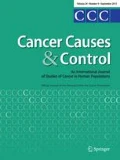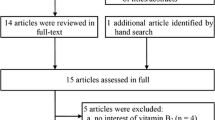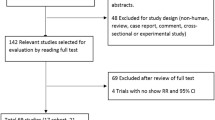Abstract
Objective
To comprehensively summarize the associations between retinol, vitamins A, C, and E and breast cancer, and quantitatively estimate their dose–response relationships.
Methods
We searched PubMed, Embase, and Cochrane databases (from January 1982 to 15 March 2011) and the references of the relevant articles in English with sufficient information to estimate relative risk or odds ratio and the 95% confidence intervals, and comparable categories of vitamins. Two reviewers independently extracted data using a standardized form, with any discrepancy adjudicated by the third reviewer.
Results
Overall, 51 studies met the inclusion criteria. Comparing the highest with the lowest intake, total vitamin A intake reduced the breast cancer risk by 17% (pooled OR = 0.83, 95% CI: 0.78–0.88). Further subgroup analysis based on study design did not change the significant reduction. Although the dietary vitamin A, dietary vitamin E, and total vitamin E intake all reduced breast cancer risk significantly when data from all studies were pooled, the results became nonsignificant when data from cohort studies were pooled. The significant association between total retinol intake and breast cancer in all studies became nonsignificant in case–control studies but remain significant in cohort studies. No significant dose–response relationship was observed in the higher intake of these vitamins with reduced breast cancer risk.
Conclusions
Our results indicate that both the total intake of vitamin A and retinol could reduce breast cancer risk. However, associations between other vitamins and breast cancer seem to be limited.



Similar content being viewed by others
References
Buell P (1973) Changing incidence of breast cancer in Japanese-American women. J Natl Cancer Inst 51(5):1479–1483
Thomas DB, Karagas MR (1987) Cancer in first and second generation Americans. Cancer Res 47(21):5771–5776
Armstrong B, Doll R (1975) Environmental factors and cancer incidence and mortality in different countries, with special reference to dietary practices. Int J Cancer 15(4):617–631
Kelsey JL, Horn-Ross PL (1993) Breast cancer: magnitude of the problem and descriptive epidemiology. Epidemiol Rev 15(1):7–16
Altucci L, Gronemeyer H (2001) The promise of retinoids to fight against cancer. Nat Rev Cancer 1(3):181–193
Aggarwal BB, Sundaram C, Prasad S, Kannappan R (2010) Tocotrienols, the vitamin E of the 21st century: its potential against cancer and other chronic diseases. Biochem Pharmacol 80(11):1613–1631
Ullah MF, Khan HY, Zubair H, Shamim U, Hadi SM (2011) The antioxidant ascorbic acid mobilizes nuclear copper leading to a prooxidant breakage of cellular DNA: implications for chemotherapeutic action against cancer. Cancer Chemother Pharmacol 67(1):103–110
Zhang S, Hunter DJ, Forman MR, Rosner BA, Speizer FE, Colditz GA, Manson JE, Hankinson SE, Willett WC (1999) Dietary carotenoids and vitamins A, C, and E and risk of breast cancer. J Natl Cancer Inst 91(6):547–556
Cho E, Spiegelman D, Hunter DJ, Chen WY, Zhang SM, Colditz GA, Willett WC (2003) Premenopausal intakes of vitamins A, C, and E, folate, and carotenoids, and risk of breast cancer. Cancer Epidemiol Biomarkers Prev 12(8):713–720
Bohlke K, Spiegelman D, Trichopoulou A, Katsouyanni K, Trichopoulos D (1999) Vitamins A, C and E and the risk of breast cancer: results from a case-control study in Greece. Br J Cancer 79(1):23–29
Ronco A, De Stefani E, Boffetta P, Deneo-Pellegrini H, Mendilaharsu M, Leborgne F (1999) Vegetables, fruits, and related nutrients and risk of breast cancer: a case-control study in Uruguay. Nutr Cancer 35(2):111–119
Adzersen KH, Jess P, Freivogel KW, Gerhard I, Bastert G (2003) Raw and cooked vegetables, fruits, selected micronutrients, and breast cancer risk: a case-control study in Germany. Nutr Cancer 46(2):131–137
Nissen SB, Tjonneland A, Stripp C, Olsen A, Christensen J, Overvad K, Dragsted LO, Thomsen B (2003) Intake of vitamins A, C, and E from diet and supplements and breast cancer in postmenopausal women. Cancer Causes Control 14(8):695–704
Levi F, Pasche C, Lucchini F, La Vecchia C (2001) Dietary intake of selected micronutrients and breast-cancer risk. Int J Cancer 91(2):260–263
Michels KB, Holmberg L, Bergkvist L, Ljung H, Bruce A, Wolk A (2001) Dietary antioxidant vitamins, retinol, and breast cancer incidence in a cohort of Swedish women. Int J Cancer 91(4):563–567
Do MH, Lee SS, Jung PJ, Lee MH (2003) Intake of dietary fat and vitamin in relation to breast cancer risk in Korean women: a case-control study. J Korean Med Sci 18(4):534–540
Moorman PG, Ricciuti MF, Millikan RC, Newman B (2001) Vitamin supplement use and breast cancer in a North Carolina population. Public Health Nutr 4(3):821–827
Dorjgochoo T, Shrubsole MJ, Shu XO, Lu W, Ruan Z, Zheng Y, Cai H, Dai Q, Gu K, Gao YT et al (2008) Vitamin supplement use and risk for breast cancer: the Shanghai Breast Cancer Study. Breast Cancer Res Treat 111(2):269–278
Wang C, Baumgartner RN, Yang D, Slattery ML, Murtaugh MA, Byers T, Hines LM, Giuliano AR, Baumgartner KB (2009) No evidence of association between breast cancer risk and dietary carotenoids, retinols, vitamin C and tocopherols in Southwestern Hispanic and non-Hispanic White women. Breast Cancer Res Treat 114(1):137–145
Challier B, Perarnau JM, Viel JF (1998) Garlic, onion and cereal fibre as protective factors for breast cancer: a French case-control study. Eur J Epidemiol 14(8):737–747
Cui Y, Shikany JM, Liu S, Shagufta Y, Rohan TE (2008) Selected antioxidants and risk of hormone receptor-defined invasive breast cancers among postmenopausal women in the Women’s Health Initiative Observational Study. Am J Clin Nutr 87(4):1009–1018
Malin AS, Qi D, Shu XO, Gao YT, Friedmann JM, Jin F, Zheng W (2003) Intake of fruits, vegetables and selected micronutrients in relation to the risk of breast cancer. Int J Cancer 105(3):413–418
Gaudet MM, Britton JA, Kabat GC, Steck-Scott S, Eng SM, Teitelbaum SL, Terry MB, Neugut AI, Gammon MD (2004) Fruits, vegetables, and micronutrients in relation to breast cancer modified by menopause and hormone receptor status. Cancer Epidemiol Biomarkers Prev 13(9):1485–1494
Mannisto S, Pietinen P, Virtanen M, Kataja V, Uusitupa M (1999) Diet and the risk of breast cancer in a case-control study: does the threat of disease have an influence on recall bias? J Clin Epidemiol 52(5):429–439
Mignone LI, Giovannucci E, Newcomb PA, Titus-Ernstoff L, Trentham-Dietz A, Hampton JM, Willett WC, Egan KM (2009) Dietary carotenoids and the risk of invasive breast cancer. Int J Cancer 124(12):2929–2937
Sharhar S, Normah H, Fatimah A, Fadilah RN, Rohi GA, Amin I, Cham BG, Rizal RM, Fairulnizal MN (2008) Antioxidant intake and status, and oxidative stress in relation to breast cancer risk: a case-control study. Asian Pac J Cancer Prev 9(2):343–349
Nagel G, Linseisen J, van Gils CH, Peeters PH, Boutron-Ruault MC, Clavel-Chapelon F, Romieu I, Tjonneland A, Olsen A, Roswall N et al (2010) Dietary beta-carotene, vitamin C and E intake and breast cancer risk in the European Prospective Investigation into Cancer and Nutrition (EPIC). Breast Cancer Res Treat 119(3):753–765
Zhang CX, Ho SC, Chen YM, Fu JH, Cheng SZ, Lin FY (2009) Greater vegetable and fruit intake is associated with a lower risk of breast cancer among Chinese women. Int J Cancer 125(1):181–188
Bonilla-Fernandez P, Lopez-Cervantes M, Torres-Sanchez LE, Tortolero-Luna G, Lopez-Carrillo L (2003) Nutritional factors and breast cancer in Mexico. Nutr Cancer 45(2):148–155
Potischman N, Swanson CA, Coates RJ, Gammon MD, Brogan DR, Curtin J, Brinton LA (1999) Intake of food groups and associated micronutrients in relation to risk of early-stage breast cancer. Int J Cancer 82(3):315–321
Lee MM, Chang IY, Horng CF, Chang JS, Cheng SH, Huang A (2005) Breast cancer and dietary factors in Taiwanese women. Cancer Causes Control 16(8):929–937
Longnecker MP, Newcomb PA, Mittendorf R, Greenberg ER, Willett WC (1997) Intake of carrots, spinach, and supplements containing vitamin A in relation to risk of breast cancer. Cancer Epidemiol Biomarkers Prev 6(11):887–892
Howe GR, Hirohata T, Hislop TG, Iscovich JM, Yuan JM, Katsouyanni K, Lubin F, Marubini E, Modan B, Rohan T et al (1990) Dietary factors and risk of breast cancer: combined analysis of 12 case-control studies. J Natl Cancer Inst 82(7):561–569
Gandini S, Merzenich H, Robertson C, Boyle P (2000) Meta-analysis of studies on breast cancer risk and diet: the role of fruit and vegetable consumption and the intake of associated micronutrients. Eur J Cancer 36(5):636–646
Alkhenizan A, Hafez K (2007) The role of vitamin E in the prevention of cancer: a meta-analysis of randomized controlled trials. Ann Saudi Med 27(6):409–414
Berlin JA, Longnecker MP, Greenland S (1993) Meta-analysis of epidemiologic dose-response data. Epidemiology 4(3):218–228
Chene G, Thompson SG (1996) Methods for summarizing the risk associations of quantitative variables in epidemiologic studies in a consistent form. Am J Epidemiol 144(6):610–621
Trock BJ, Hilakivi-Clarke L, Clarke R (2006) Meta-analysis of soy intake and breast cancer risk. J Natl Cancer Inst 98(7):459–471
Higgins JP, Thompson SG, Deeks JJ, Altman DG (2003) Measuring inconsistency in meta-analyses. BMJ 327(7414):557–560
Egger M, Davey Smith G, Schneider M, Minder C (1997) Bias in meta-analysis detected by a simple, graphical test. BMJ 315(7109):629–634
Begg CB, Mazumdar M (1994) Operating characteristics of a rank correlation test for publication bias. Biometrics 50(4):1088–1101
Negri E, La Vecchia C, Franceschi S, D’Avanzo B, Talamini R, Parpinel M, Ferraroni M, Filiberti R, Montella M, Falcini F et al (1996) Intake of selected micronutrients and the risk of breast cancer. Int J Cancer 65(2):140–144
Graham S, Marshall J, Mettlin C, Rzepka T, Nemoto T, Byers T (1982) Diet in the epidemiology of breast cancer. Am J Epidemiol 116(1):68–75
Zaridze D, Lifanova Y, Maximovitch D, Day NE, Duffy SW (1991) Diet, alcohol consumption and reproductive factors in a case-control study of breast cancer in Moscow. Int J Cancer 48(4):493–501
Katsouyanni K, Willett W, Trichopoulos D, Boyle P, Trichopoulou A, Vasilaros S, Papadiamantis J, MacMahon B (1988) Risk of breast cancer among Greek women in relation to nutrient intake. Cancer 61(1):181–185
Lee HP, Gourley L, Duffy SW, Esteve J, Lee J, Day NE (1991) Dietary effects on breast-cancer risk in Singapore. Lancet 337(8751):1197–1200
London SJ, Stein EA, Henderson IC, Stampfer MJ, Wood WC, Remine S, Dmochowski JR, Robert NJ, Willett WC (1992) Carotenoids, retinol, and vitamin E and risk of proliferative benign breast disease and breast cancer. Cancer Causes Control 3(6):503–512
Qi XY, Zhang AY, Wu GL, Pang WZ (1994) The association between breast cancer and diet and other factors. Asia Pac J Public Health 7(2):98–104
Levi F, La Vecchia C, Gulie C, Negri E (1993) Dietary factors and breast cancer risk in Vaud, Switzerland. Nutr Cancer 19(3):327–335
Potischman N, McCulloch CE, Byers T, Nemoto T, Stubbe N, Milch R, Parker R, Rasmussen KM, Root M, Graham S (1990) Breast cancer and dietary and plasma concentrations of carotenoids and vitamin A. Am J Clin Nutr 52(5):909–915
Landa MC, Frago N, Tres A (1994) Diet and the risk of breast cancer in Spain. Eur J Cancer Prev 3(4):313–320
Richardson S, Gerber M, Cenee S (1991) The role of fat, animal protein and some vitamin consumption in breast cancer: a case control study in southern France. Int J Cancer 48(1):1–9
Marubini E, Decarli A, Costa A, Mazzoleni C, Andreoli C, Barbieri A, Capitelli E, Carlucci M, Cavallo F, Monferroni N et al (1988) The relationship of dietary intake and serum levels of retinol and beta-carotene with breast cancer. Results of a case-control study. Cancer 61(1):173–180
La Vecchia C, Decarli A, Franceschi S, Gentile A, Negri E, Parazzini F (1987) Dietary factors and the risk of breast cancer. Nutr Cancer 10(4):205–214
Freudenheim JL, Marshall JR, Vena JE, Laughlin R, Brasure JR, Swanson MK, Nemoto T, Graham S (1996) Premenopausal breast cancer risk and intake of vegetables, fruits, and related nutrients. J Natl Cancer Inst 88(6):340–348
Graham S, Hellmann R, Marshall J, Freudenheim J, Vena J, Swanson M, Zielezny M, Nemoto T, Stubbe N, Raimondo T (1991) Nutritional epidemiology of postmenopausal breast cancer in western New York. Am J Epidemiol 134(6):552–566
Iscovich JM, Iscovich RB, Howe G, Shiboski S, Kaldor JM (1989) A case-control study of diet and breast cancer in Argentina. Int J Cancer 44(5):770–776
Rohan TE, McMichael AJ, Baghurst PA (1988) A population-based case-control study of diet and breast cancer in Australia. Am J Epidemiol 128(3):478–489
Rohan TE, Howe GR, Friedenreich CM, Jain M, Miller AB (1993) Dietary fiber, vitamins A, C, and E, and risk of breast cancer: a cohort study. Cancer Causes Control 4(1):29–37
Verhoeven DT, Assen N, Goldbohm RA, Dorant E, van’t Veer P, Sturmans F, Hermus RJ, van den Brandt PA (1997) Vitamins C and E, retinol, beta-carotene and dietary fibre in relation to breast cancer risk: a prospective cohort study. Br J Cancer 75(1):149–155
Kushi LH, Fee RM, Sellers TA, Zheng W, Folsom AR (1996) Intake of vitamins A, C, and E and postmenopausal breast cancer. The Iowa Women’s Health Study. Am J Epidemiol 144(2):165–174
Hunter DJ, Manson JE, Colditz GA, Stampfer MJ, Rosner B, Hennekens CH, Speizer FE, Willett WC (1993) A prospective study of the intake of vitamins C, E, and A and the risk of breast cancer. N Engl J Med 329(4):234–240
Graham S, Zielezny M, Marshall J, Priore R, Freudenheim J, Brasure J, Haughey B, Nasca P, Zdeb M (1992) Diet in the epidemiology of postmenopausal breast cancer in the New York State Cohort. Am J Epidemiol 136(11):1327–1337
Shibata A, Paganini-Hill A, Ross RK, Henderson BE (1992) Intake of vegetables, fruits, beta-carotene, vitamin C and vitamin supplements and cancer incidence among the elderly: a prospective study. Br J Cancer 66(4):673–679
Lee IM, Cook NR, Gaziano JM, Gordon D, Ridker PM, Manson JE, Hennekens CH, Buring JE (2005) Vitamin E in the primary prevention of cardiovascular disease and cancer: the Women’s Health Study: a randomized controlled trial. Jama 294(1):56–65
Lonn E, Bosch J, Yusuf S, Sheridan P, Pogue J, Arnold JM, Ross C, Arnold A, Sleight P, Probstfield J et al (2005) Effects of long-term vitamin E supplementation on cardiovascular events and cancer: a randomized controlled trial. JAMA 293(11):1338–1347
Lin J, Cook NR, Albert C, Zaharris E, Gaziano JM, Van Denburgh M, Buring JE, Manson JE (2009) Vitamins C and E and beta carotene supplementation and cancer risk: a randomized controlled trial. J Natl Cancer Inst 101(1):14–23
Gower JD (1988) A role for dietary lipids and antioxidants in the activation of carcinogens. Free Radic Biol Med 5(2):95–111
Acknowledgments
Thanks J. Love for reviewing the paper.
Conflict of interest
All authors read and approved the final manuscript. None of the authors had any conflicts of interest.
Author information
Authors and Affiliations
Corresponding authors
Electronic supplementary material
Below is the link to the electronic supplementary material.
Rights and permissions
About this article
Cite this article
Fulan, H., Changxing, J., Baina, W.Y. et al. Retinol, vitamins A, C, and E and breast cancer risk: a meta-analysis and meta-regression. Cancer Causes Control 22, 1383–1396 (2011). https://doi.org/10.1007/s10552-011-9811-y
Received:
Accepted:
Published:
Issue Date:
DOI: https://doi.org/10.1007/s10552-011-9811-y




